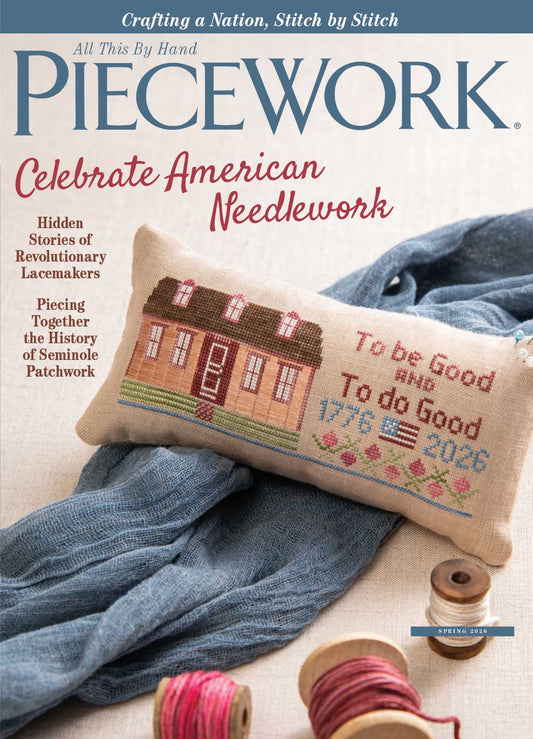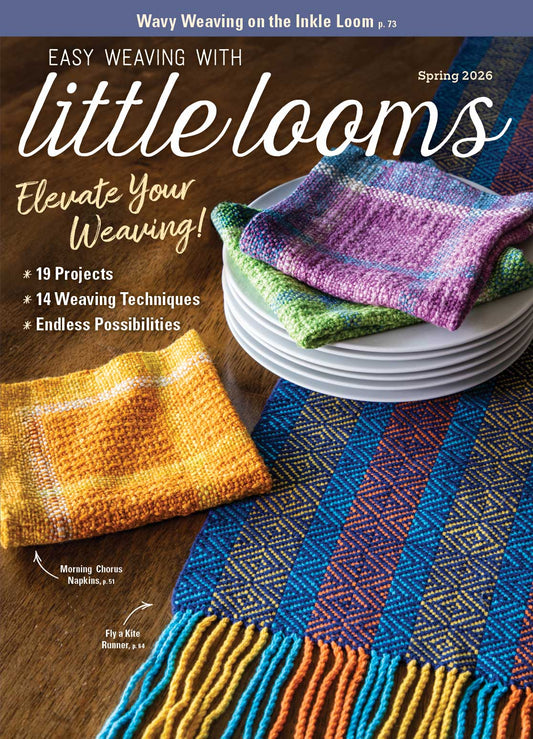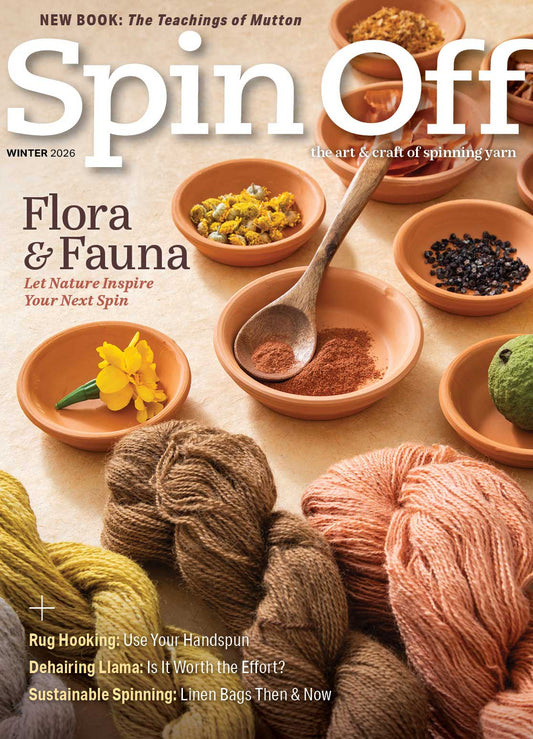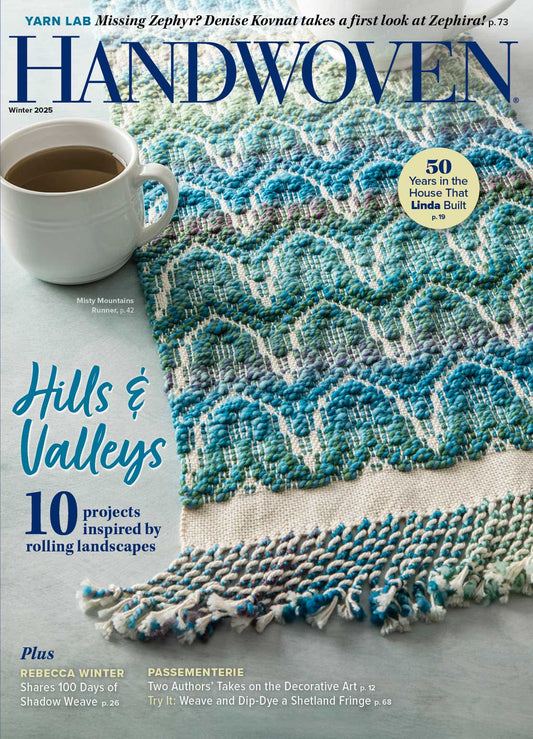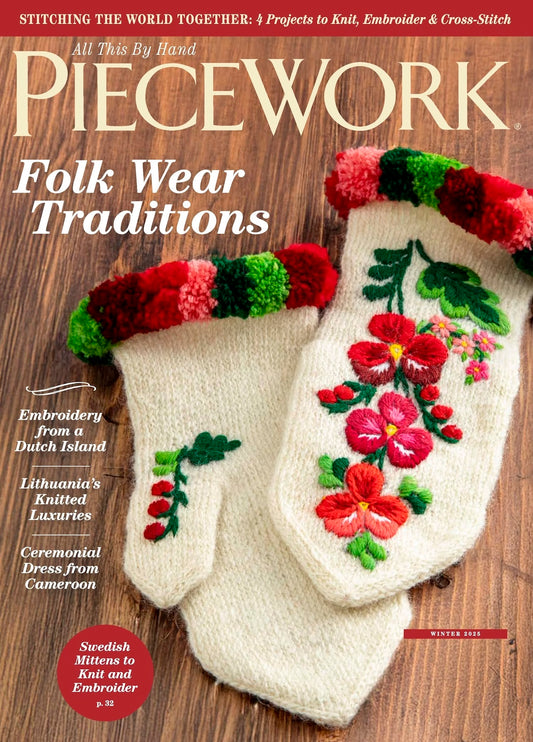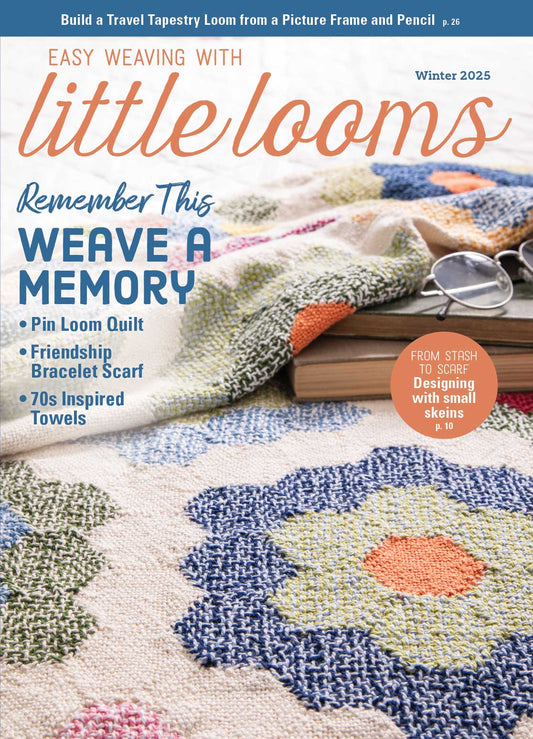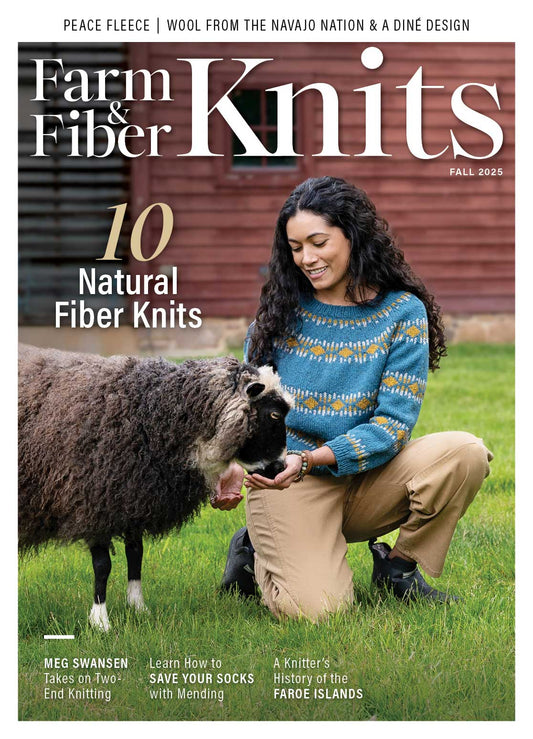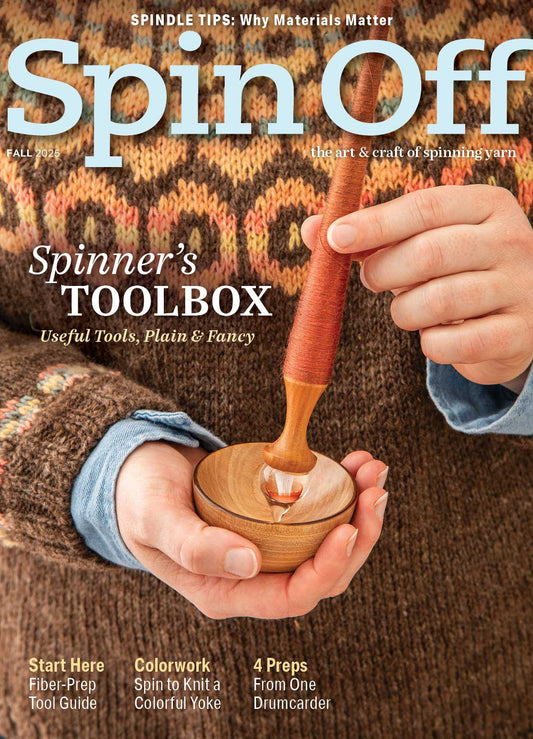|
PieceWork July/August 1995
Now available for individual download!
|
| |
|
Yarn as a Lifeline
“Something as simple as yarn can make a difference. In the United States, where knitters have access to yarn from everywhere and usually can afford to purchase materials for a project at least once a year, it is hard to conceive of a world in which yarn is precious and hard to get.” Find a new sense of gratitude with this tale of women knitting in the Balkans in the winter of 1993-1994.
|
| |
 |
| |
|
Writing Her Life in Thread
Learn the story of Pearl Allen from the machine-embroidered words she added to chicken feed bags and flour sacks. Daughter of first-generation English immigrants to the United States, Pearl’s formal education ended after the fourth grade. However, this didn’t hold Pearl back from homesteading, raising children, and being an avid reader and accomplished seamstress. See lovely photographs of Pearl’s embroidered works and try your hand at some of Pearl’s tatted lace with the Pearl’s Tatted Cluny Lace pattern. Plus, try A Recipe Potholder to Machine-Embroider to create a household relic similar to Pearl’s.
|
| |
 |
| |
|
The Waiting, Working Women of Nantucket Island
Learn about the first settlers of Nantucket Island and Mary Coffin Starbuck, one of the most remarkable women of the early settlement. When Mary converted to the Quaker religion in 1701 and many other settlers followed her lead, the island community began to follow the Quaker tenant that men and women were socially and spiritually equal. In turn, this led to women becoming profitable and successful masters of household and business alike, and creating their own handcraft and textile industry. Create your own story with the Pinkeep to Embroider pattern that is reminiscent of those used by the women of Nantucket.
|
| |
 |
| |
|
Husbands Came First and Then We Knitted for the Red Cross
Read Robin Hansen’s account of her family’s deep knitting tradition that started as a craze in the thirties but became utilitarian in the forties when the women in the family began to knit to support soldiers in the war. “They produced on order from the American National Red Cross the thousands of uniform helmet liners, gloves, socks, ‘sea boots,’ vests, sweaters, and scarves that helped to keep Allied troops warm through the brutal North Atlantic winters of the war years.”
|
| |
 |
| |
|
Needle In, Wool Round, Needle Out
“‘Knit One Purl Two,’ recorded by Glenn Miller and his band in 1942 was one of several songs composed about knitting during World War II. ‘Knit, Sister, Knit’ and ‘Knit a Kiss, Purl a Prayer’ were other songs that set to music the patriotic fervor that had a nation of knitters knit-oneing and purl-twoing for the troops, responding to calls from the American National Red Cross and other relief organizations that sought to meet the world's wartime need for warm clothing.” Learn more about knitting in a time of war and create your own knitted utilities with the Washcloths to Knit and Crochet pattern.
|
| |
 |
| |
|
Don’t Give Up the Flags
Learn about the preservation efforts of Amelia Bold Fowler and Katherine Fowler Richey, mother and daughter. These two women worked to restore and strengthen Civil War flags in early 1900. Using an embroidery stitch she invented, Amelia ultimately preserved hundreds of historically significant flags. Enjoy this story of American ingenuity and preservation and meet Amelia and Katherine through the article and photographs of their restoration project.
|
| |
 |
| |
|
Making a Case for the Abolitionist Quilt
“As long ago as the 1840s, groups of American women made signature quilts to commemorate events or honor individuals important to them. Usually, each woman would embroider her name on her quilt block or sign it in ink, and she might add a date, a Bible verse, or an appropriate sentiment. Probably because of their similarity to the autograph albums popular at the time of the quilts' origin, quilters called these ‘album quilts.’” Learn about the historical significance of these ‘album quilts’ and their role in the abolition movement.
|
| |
 |
| |
|
The 1933 World’s Fair Quilt Contest
The Sears National Quilt Contest attracted tens of thousands of quilt entries. Learn about how these quilts reflected the century of progress in America from 1833 to 1933, a century that saw many scientific and social advances. Witness the quilt revival of the 1930s, the announcement of the Sears quilt contest, and Margaret Caden’s grand-prize winning quit. Enjoy these pieces of quilting history, photographs of the historical quilts, and create your own prize-winning piece with the Baby’s Bib to Quilt pattern.
|
|
 |
|
|
A Wartime Story in an Embroidered Purse
Through Judith MacKenzie’s telling, discover a little black silk evening bag adorned with forbidden-stitch rose designs and filled with love letters written during and after World War II. Meet the recipient of the letters, a young Englishwoman living in Canada, and the writer, a married soldier from Scandinavia. Plus, learn about the construction and history of the forbidden stitch used in the story.
|
|
 |
| |
 |
|
In every issue of PieceWork magazine, you will be amazed at the amount of information packed into these pages:
- Be inspired by needleworkers past and present. In each issue, you’ll meet needleworkers with unique stories to tell and special projects to share.
- Explore traditional needlework throughout history. In addition to the people who did the work, you’ll get an up-close look at what they created and how they did it.
- Test your needlework techniques with projects ranging from embroidery to knitting, quilting to beading, and crochet to cross-stitch.
- And so much more!
This issue was scanned from an original printed issue.
|












